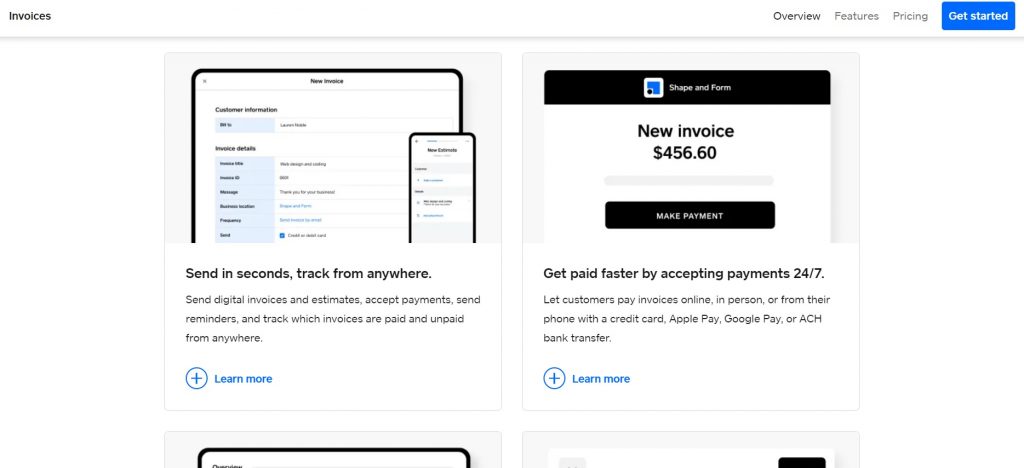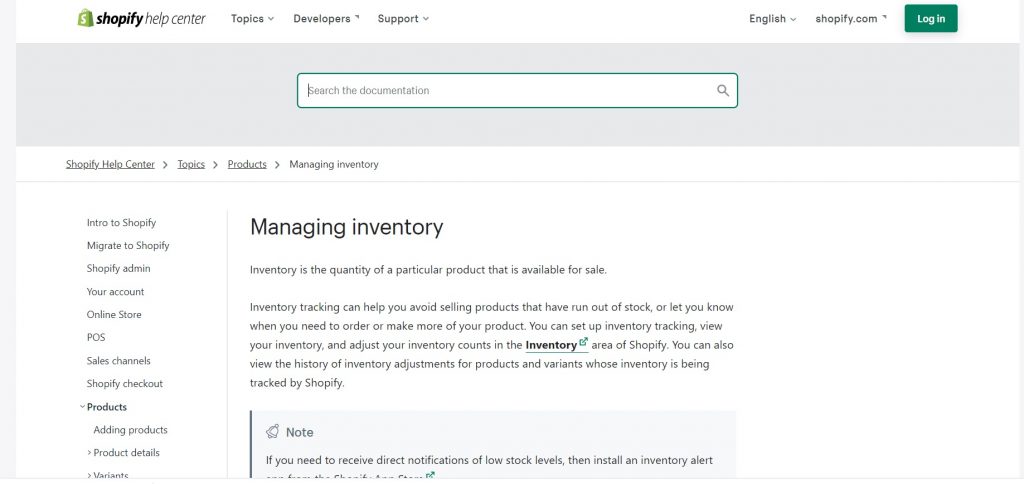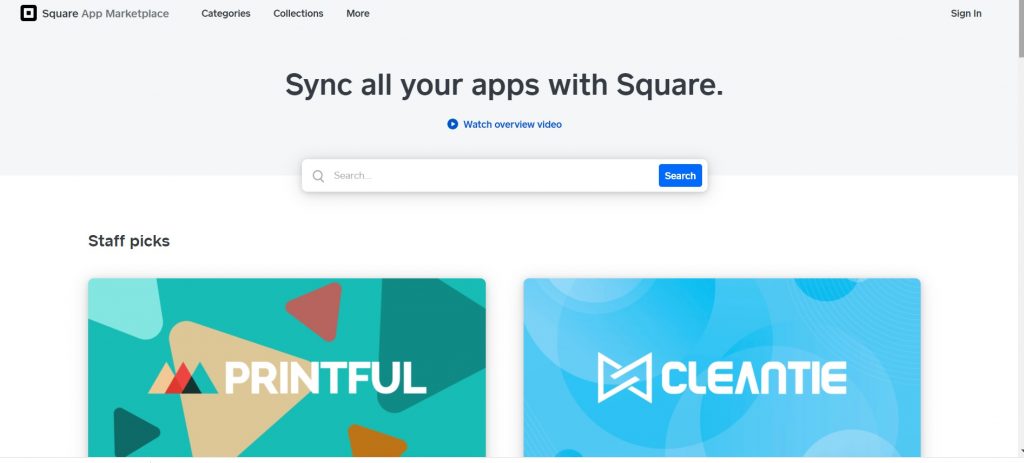Currently, the market of e-Commerce services offers a wide variety of platforms with different pricing plans, set of features, and usability. Obviously, it’s impossible to cover all of them in one review. Therefore, I chose the most popular ones among them: Square and Shopify that offer the possibility of creating an online store and selling in-person.
The growing popularity of these services is explained by built-in analytics and reporting systems, tax management systems, affiliate programs, and much more.
But what service is right for you?
Keep reading to find an answer to this and many other questions.
Before we start, I offer you to learn more about Shopify’s electronic commerce functionality:
In-depth comparison
Ease of use
Square
To start working with Square, it’s necessary to sign up and fill in the following information:
- type of your business (health and care, retail, transportation, etc.);
- business category depending on your business type;
- name of your company;
- contact details and address;
- city and postal.
It’s important to check if the service can process payments in your region. However, if a certain country isn’t on this list, then you’ll still be able to use other Square products
In the next step, you’ll be offered to download a mobile application from Google Play Store or Apple App Store.
Now, let’s check out what Square’s dashboard contains.
On the left side of the tab, you could find the following buttons:
| Buttons | Content |
| Home | Information about gross sales, transactions, top-selling items of today and/or the last 30 days.You may also activate a “Set Up“ guide that helps you with onboarding (I’d recommend this option for beginners). |
| Reports | Using this option, you may get comprehensive reports on taxes, sales, cash drawers, payment methods, etc. You may use default settings and filters or customize them according to your needs.In the upper right corner of this page, you may find an “Export” button. By clicking on it, you may get a sales summary in an Excel file. |
| Subscriptions | Here, you can create your own pricing plan and offer your customers to subscribe. |
| Transactions | Using this button, it’s possible to check all the transactions, filter them by type and time, export information, and many more. |
| Settings | This button leads you to the section, where you may set up passwords and 2-step verification to enhance the security of your web resource. Also, you may change the timezone, language settings, and set up email notifications. |
| Orders | Here, you can add your partners, filter orders by type (delivery, pickup, shipment, etc.) and status (active, completed, etc.). |
| Customers | By clicking on this button, you’ll be transferred to the customer management section. Here, you can build customer lists, check the activity of your clients, group your customers according to a certain characteristic, and many more. |
| Applications | Here, you can choose services you need from the App Store, check out recommended applications, and synchronize them. |
| Items | Here, you can build or import items, set up prices, create item categories, and many more. This topic will be described in detail below. |
Also, in the upper right corner of the dashboard, you can find the buttons for quick access to your profile setting, notifications, and help center.
Currently Square supports only English and Spanish languages, which is pretty few compared to Shopify (about 33 languages).
Shopify
During Shopify registration, it’s important to take a little survey. Below, I’ve listed the information the platform’s users need to fill in:
- if you already selling;
- your current revenue;
- your industry (electronic, sport, food, etc.);
- if you’re going to create a store for yourself or a client.
In the last step, you need to fill in the financial information and location details. Then, you’ll be transferred to the working area to start creating your webstore.
Now, let’s look at the buttons the Shopify dashboard has.
| Buttons | Content |
| Customers | By clicking on this button, you can get access to creating and editing your customers’ lists, your clients’ information, and working with the history of purchases. |
| Orders | Here, you can manage orders and orders’ drafts, set up payment methods, and work with abandoned carts. |
| Marketing | After clicking this button, you’re transferred to the email campaigns and automation editor. Also, you can check out the information about different types of orders and products from your store. |
| Products | Here, you can create or import products, set up prices, and many more. |
| Application | By clicking this button, you’re transferred to the Shopify application store. There, you could choose and connect applications for different purposes. |
| Analytics | Here, you can get comprehensive data about the best-selling products, average order value, total number of sales, and so on. |
| Discounts | Here, you can create discount codes to add them to the different pages of your webstore (for example, to the checkout pages). Also, you can use an automatic discount creation. In this case, they’ll be added to your clients’ carts. |
| Sales channels | Here you can select among free (Emadri, Walmart, Wanelo, etc.) and paid (Mothership) sales channels. |
| Online store | By clicking this button, you can get access to the webstore’s themes editor. There, you can create and edit web pages, design blog posts, work with custom domains, and many more. |
POS features description
Before all, I want to point out that both e-Commerce services come with pretty similar point-of-sale systems. That’s why I’ve decided to highlight the key differences between them.
Square’s users have no need to pay any fee for downloading or utilizing the service’s point of sale application. In turn, its competitor comes with a monthly fee for using its application.
Both e-Commerce services accept debit and credit cards, checks, and cash.
Now, let’s take a look at the common functionality offered by e-Commerce services.
Offline payments
Using both services, it’s possible to accept payments in offline mode. But in this case, the seller takes all the responsibility for the possible interruptions.
Split tender
You can use the option to split bills among different customers. It can also be useful if a customer’s group is divided into those who want to pay in cash and those who want to use credit or debit cards.
Receipts
The systems permit users to send receipts to customers in SMS or by email. Besides, it’s possible to connect a receipt printer to your smartphone or tablet and provide your customers with physical copies.
Time management
Square and Shopify can help you control timekeeping (using timecards) and scheduling; add new team members to the payroll, etc.

Tax management
Also, you could manage taxes right on the platforms:
- add them to the bill or set them up as an addition;
- apply taxes for certain items only, etc.
At the same time, it’s impossible to use auto-detection for tax rates: a company needs to do research and add them manually.
In case you have a service-based company, you can get access to the following options:
- print tickets;
- add tips to bills.
Application for retail
If you’re involved in a retail business, you can easily set up your mobile device and get access to the following features:
- multi-location items management system;
- creation of loyalty program for your clients;
- email campaigns designer;
- reports on your webstore activity (best selling products, staff check-ins, etc.).
Also, you can create customer lists, use instant funds transfer, and many more.
Synchronizing option
You can automatically sync your inventory across your online stores and check out all the important information.

If certain items are out of stock, you’ll be notified by the system in advance.
Selling online
First of all, I’d like to describe the difference between the platforms as it was in the previous section.
Number of e-commerce tools. Compared to Shopify, Square has fewer tools for creating a webstore. This is explained by the fact that Square is mostly a payment processor, while Shopify is a full-fledged shopping cart software.
Nonetheless, it’s possible to increase Square’s functionality using third-party integrations like shopping cart software. While choosing one of these services, don’t forget to check if it’s compatible with Square (for example, you can use Wix or WooCommerce).
You may find the full list of the available services on Square’s official website. Also, the platform doesn’t allow its users to choose from a large set of themes during webstore creation (like Shopify does with its 70+ templates).
Now, let’s check what platforms have in common.
Domains. Square and Shopify provide users with free subdomains. Along with that, you may connect your custom domain.
APIs access. Both platforms give access to application programming interfaces for creating your own integrations if you’re versatile in coding.
Analytics. As for analytics and reporting, the services allow you to receive data about:
- amount of money you earn during a certain period using sales report feature;
- the aggregate value of your items in a certain category;
- vendors who supply top-selling products;
- products, which increase your revenue, etc.
Order management
Using this feature, it’s possible to check orders, which were declined, approved, delivered, etc.
Buy buttons
You can add “Buy” buttons to any page of your webstore that is especially useful for those who don’t have a shopping cart.
Bandwidth and items restrictions
When it comes to bandwidth and an available number of products to sell, both platforms don’t have any restrictions.

Pricing plans
Square
| Features | Free plan | Professional $12 per month | Performance$26 per month | Premium plan$72 per month |
| Processing rate for online payments | 2.9% plus 30¢ | 2.9% plus 30¢ | 2.9% plus 30¢ | 2.6% plus 30¢ |
| Products management | ||||
| Number of items you can sell | no limits | no limits | no limits | no limits |
| Product categories | option is available | option is available | option is available | option is available |
| Time-based categories | option is available | option is available | option is available | option is available |
| Ability to use Global Trade Item Number | option is available | option is available | option is available | option is available |
| Product transfer between different webstores | option is unavailable | option is available | option is available | option is available |
| Item counting option | option is unavailable | option is available | option is available | option is available |
| Cost of Goods Sold tool | option is unavailable | option is available | option is available | option is available |
| Items history | option is unavailable | option is available | option is available | option is available |
| Vendor management tool | option is unavailable | option is available | option is available | option is available |
| Checkout | ||||
| Saved shopping carts | option is available | option is available | option is available | option is available |
| Barcodes scanning using iPad | option is available | option is available | option is available | option is available |
| Advanced product search feature | option is available | option is available | option is available | option is available |
| Exchanges | option is unavailable | option is available | option is available | option is available |
| Online sales | ||||
| Free online store building | option is available | option is available | option is available | option is available |
| Synchronizations of items between webstores | option is available | option is available | option is available | option is available |
| Product review | option is unavailable | option is unavailable | option is available | option is available |
| Discounted shipping rates | option is unavailable | option is unavailable | option is available | option is available |
| Custom domains usage | option is unavailable | option is available | option is available | option is available |
| Payments | ||||
| SquarePay | option is available | option is available | option is available | option is available |
| Information security compliance | option is available | option is available | option is available | option is available |
| PayPal | option is unavailable | option is unavailable | option is available | option is available |
| Gift cards | option is unavailable | option is unavailable | option is available | option is available |
| Reports | ||||
| Sales reports | option is available | option is available | option is available | option is available |
| Profit reports | option is unavailable | option is available | option is available | option is available |
| Vendor sales details | option is unavailable | option is available | option is available | option is available |
| Team management | ||||
| Timecards usage | option is available | option is available | option is available | option is available |
| Time tracking | option is available | option is available | option is available | option is available |
| Multiple wage rates | option is available | option is available | option is available | option is available |
Also, Square offers a full-fledged 30-day free trial.
Shopify
| Features | Basic$29 for a monthly subscription | Shopify$79 for a monthly subscription | Advanced$299 for a monthly subscription |
| E-commerce website building | option is available | option is available | option is available |
| Ability to sell an unlimited number of items | option is available | option is available | option is available |
| Number of co-users who have access to POS and Shopify admin panel | 2 | 5 | 15 |
| 24/7 support option | option is available | option is available | option is available |
| Sales channels creation | option is available | option is available | option is available |
| Number of inventory locations you can use | 4 | 5 | 8 |
| Discount codes | option is available | option is available | option is available |
| Secure Sockets Layer certificates | option is available | option is available | option is available |
| Abandoned cart recovery | option is available | option is available | option is available |
| Gift cards | option is available | option is available | option is available |
| Type of report option | option is unavailable | Standart | Advanced |
| Shipping | |||
| Percentage of shipping discount | 77% | 88% | 88% |
| Ability to print shipping labels | option is available | option is available | option is available |
| Payments | |||
| Rates for in-person transaction (in USD) | 2.7% plus 0¢ | 2.5% plus 0¢ | 2.4% plus 0¢ |
| Rates for credit cards (in USD) | 2.9% plus 30¢ | 2.6% plus 30¢ | 2.4% plus 30¢ |
| Fee for transaction (in case, you don’t use Shopify Payments feature) | 2.0% | 1.0% | 0.5% |
| POS | |||
| Shopify Lite | option is available | option is available | option is available |
| Shopify Pro | + $89 per month per 1 location | + $89 per month per 1 location | + $89 per month per 1 location |
| Global selling | |||
| Number of available currencies | 133 | 133 | 133 |
| Number of available languages | up to 20 | up to 20 | up to 20 |
| Ability to use country-specific domains | option is unavailable | option is available | option is available |
| Ability to set up individual pricing for items in different countries or regions | option is unavailable | option is unavailable | option is available |
The platform allows you to activate a full-fledged free trial for 14 days.
Customer support
Square
The platform offers a large knowledge base and insightful blog, containing information that covers all common topics. Also, you can take a closer look at the Square seller community, where you can share your experience and keep in touch with other Square’s users.
If you experience technical issues, the platform allows you to contact Square’s developers in their Slack community or on the developer’s forum. The service also features an engineering blog that contains a lot of posts and articles about data science, application programming interface, open-source, Square’s software development kit, and many more.
Also, you may activate the chatbot option or even order a callback.
Shopify
Shopify has an active community and organizes events, which you can filter by topic, type, learning level, and so on. If you scroll down, you can find local events, which are held offline.
“Business courses” is another educational feature that explains the relevant topics with videos:
- creating a business using Instagram;
- setting the goals;
- email marketing and electronic commerce;
- search engine optimization, and many more.

Also, the platform supports ticket systems.
You may follow Shopify on social networks: Facebook, YouTube, Twitter, LinkedIn, Instagram, Pinterest.
FAQ
Does Square support cryptocurrency?
Yes, this option is available. Currently, it’s possible to carry out financial transactions using Bitcoin, Litecoin, Ethereum, Bitcoin Cash.
Can I call Shopify experts?
No, this option is currently unavailable.
Do I need to pay for issuing refunds on Square?
No, this option is out of charge.
What is a Hatchful resource on the Shopify website?
It’s related to a Shopify service, which is focused on creating and customizing logos for your company.
How long does it take to transfer funds from Square to my bank account?
Usually, it takes about 1 or 2 days.
Is it possible to get a ready-made webstore on Shopify?
Yes, you can go to Shopify’s homepage, scroll down and find a link to the “Exchange” resource.
Summing up
As we can see, today’s competitors are pretty similar and offer tools for:
- creating a platform for selling products and services not only online but also offline;
- managing your inventory;
- promoting your web resource and expanding the target audience;
- detailed analyzing of store performance and customers’ activity;
- creating sales funnels;
- processing all types of payments, and many more.
At the same time, the main difference lies in Square’s and Shopify’s built-in functionality. As it was mentioned above, Square cannot boast the same set of embedded tools for building a web store compared to Shopify. Specifically, I mean connecting the shopping cart function.
However, this flaw can be fixed with third-party shopping cart integration that you can get on Square’s application store.
Also, Square provides its users with a completely free plan, but it comes with limited functionality and high transaction rates.
The platform has a newbie-friendly and well-structured UI that makes it a solution for users without any experience in working with electronic commerce software.
Although Shopify is pricier, it offers everything you need to start selling almost any type of product or service. Even if purchasing a basic plan, you don’t need to look for external services or integrations to make up for the lack of functionality.
